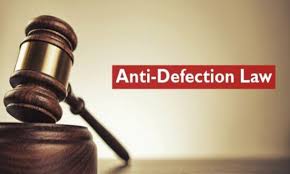Latest News
Anti-defection law - Flaws and challenges

Loopholes in the law
Power to the Speaker- as per Rule 6 of the schedule, the Speaker of the House or the Chairman has been given wide and absolute powers to decide the case related to disqualification of the members on the grounds of defection. The Speaker still remains as the member of the party which had nominated him/her for the post of speaker.
One of the major criticisms of this power is that not necessary the speaker has legal knowledge and expertise to look upon and perform such acts in such cases.
Judicial Review- as per the Rule 7, which bars the jurisdiction of the courts in any matter connected with disqualification of a member of a House, which states that disqualification of a member of house is outside the jurisdiction of all courts including the Supreme Court under Article 136 and High Courts under Article 226 and 227 of the Constitution to review the decisions made by the Speaker in this regard.
This can have terrible consequences in the light of difficulties enumerated above. The legislature during a way tried to limit the facility of judiciary provided under the Constitution, which isn't tenable.
No individual stand on part of members- according to the Rule 2 it can be seen that the anti-defection law puts the members of the party into a bracket of obedience in accordance with the rules and policies of the party , restricting the legislator’s freedom to oppose the wrong acts of the party, bad policies, leaders and bills.
A political party acts as a dictator for its members who are not allowed to dissent. In this way it violates the principle of representative democracy wherein the members are forced to obey the high command.
In a well-settled representative democratic environment, people wish for that the electorate are taken care of their acts rather than working on the instructions and wishes of the party leaders and their policies. With the increasing powers being given to a party member, the members are not allowed to vote on any issue independently whether they are a part of party manifesto or not. The law tends to blur the distinction between defiance on part of members and defection of the members leading to their disqualification. With the lack of individuality on the part of members belonging to their parties, the anti-defection laws have failed to achieve the desired results.
What amounts to ‘voluntarily giving up’- Rule 2(1)(a) of the Tenth Schedule mentions that the member of the House would be disqualified from the party if he voluntarily gives up his membership of the political party.
But the Schedule doesn't clarify what “voluntarily giving up” means? Does it only cover the resignation of party member or does it have a wider meaning than that?
This question had arise before the Supreme Court in Ravi Naik v. Union of India[6] and the Court while interpreting the phrase held that it has a wider connotation and can be inferred from the conduct of the members. The words ‘voluntarily gives up his membership' weren't held synonymous with ‘resignation'. It was held that an individual may voluntarily hand over his membership of a party even without tendering his resignation from the membership of that party.
Rajendra Singh Rana v. Swami Prasad Maurya et al. ,[8] is yet one more case which expanded the aiming to the words ‘voluntarily abandoning of the membership.’ it had been held within the case that a letter by an elected party member to the Governor requesting him to call upon the leader of the other party to make a Government would by itself amount to an act of voluntarily abandoning membership of the party of which he's an elected member.
Problem with merger provision- While Rule 4 of the Tenth Schedule seems to provide some exception from disqualification of members in the cases relating to mergers, there seems to be some loophole in the law. The provision tends to safeguard the members of a political party where the original political party merges with another party subject to the condition that atleast two-third of the members of the legislature party concerned have agreed to such merger. The flaw seems to be that the exception is based on the number of members rather than the reason behind the defection.
The common reasons for defection of individual members seem to be availability of lucrative office or ministerial posts with the other party. It can very well be expected that the very same reason might be available with those two-third members who have agreed to the merger. If defection by an individual member is not acceptable, it is very much difficult to assert that the same would be valid in case of mergers only because a large number of people are involved.
This tends to undermine the democracy of the nation and thus the provision seems to be flawed. The provision could have been more useful if it had taken into consideration the real reason for merger rather than the number of members involved.



































































































